Origin of science in Greece (BC) 4th century)
Introduction
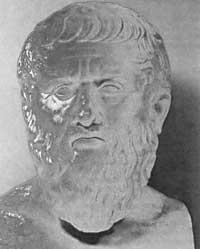
Greek science in the prosperous first era rose to the top in the age of atomistic schools. Then there was a stop (or rather a delay). Perhaps, when Athens appeared in the democratic state, the main concern of the citizens, leaving aside the Natural Sciences, departed from the paths of rhetoric and politics. Therefore, philosophers began to work primarily on ethics and economics.
In this delay, the atomists themselves were also at fault. These, while recognizing that reality was matter, questioned the capacity of our senses to inform the reality of the outside world. At the other extreme, although the only one that really existed in the judgment of his enemies was wisdom, doubt or skepticism.
In this environment arose the great Socrates. After a deep analysis of the results of sophists, politicians and philosophers, Socrates is a man who harshly denounced as soon as he found ignorance, pride and foolishness. In his opinion, intelligence dominates everyone, while the senses only get an approximation; authentic and ideal appearances are heard by the mind and not by others.
Therefore, for Socrates, the only thing worth investigating is intelligence, and so, the true self is not my body, but my soul. This philosophy made human responsibility move away from Nature. However, according to Aristotle, Socrates offered science two very important results: universal definitions and inductive reasoning.
Plato was a pupil of Socrates -a. C. 428-348 - brought idealism to the top; in it skepticism blends with mysticism. His ideas about Nature extracted them from the needs and desires of the human being in a aprioristic way. That is why he believes that the sphere is a perfect shape. Therefore, the Universe must be spherical. God has given a circular motion to the bodies of kneading, and they do so over time.
The raw material is space. Therefore, the four elements (air, fire, water, earth) are not letters of the alphabet, but in any case they will be syllables. In Plato the influence of Pythagorean doctrine on appearance and number can be well appreciated. But it must be said that their results regarding astronomy are more backward than the most Pythagorean; their own stars, moved by their souls, float freely in space. However, to express the imaginary movement of the Sun around the Earth one could use the cycles of Plato (astronomical system that was later developed by Hipparchus and Ptolemy), although it seems that Plato himself, in his old age, said that what moved was the Earth.
Plato's physics and biology are anthropomorphic and have their ethical side. His cosmo is a living structure: with his body, his soul and his mind. Based on this basis, a theory of Nature and the structure of the Universe and of human physiology is deduced. According to this, he established a dream analogy between the cosmos and man, between the macrocosm and the microcosm.
For all these ideas, Plato's Science has been, above all, a dream. He profoundly rejected research as mechanical or ephemeral art.
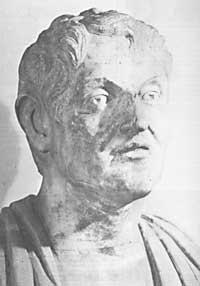
Instead, mathematics was a totally deductive science, so he liked it very much. Plato himself launched the idea of negative numbers and regarded the line as something flowing from a point
Plato therefore structured the theory of "ideal forms". Based on this, they can have the fullness of being "appearances" or "ideas" and not every grain or thing. Then this theory was used in the classification problem. In nature we can see many very similar groups: on the one hand, triangles, on the other, animals or plants. Once this classification was made, each group had nothing to do with the others and the platonists who were in charge of the investigation of the previously accepted similarity between the elements of each group.
To express these similarities Plato assumed the essence of a model. Then everything would be closer or closer to the prototype. All things of nature are changing nonstop. The models are real and immutable. From here came Plato's idealism, although later it was called "realism", because according to this theory Platonic ideas have a true essence. Moreover, the only reality is the same and therefore the only topic of rational research.
The Platonic school lasted for years and has been known as Academy. Its creator is Plato himself, where metaphysical research predominates. However, it has given some result to the scientific field. These include Eudoxo de Znido. This is an initial student who can be considered creator of experimental cosmology. In the field of astronomy we have Calipo and Heraclides Pontiko de Zizi.
The latter hypothesized that the Earth revolved around its axis in twenty hours. And also of those who rotate like satellites around the Sun Mercury and Venus. The Academy of Athens lived nine centuries and A.D. In 529 the emperor Justinian ordered his closure.
Aristotle
Calcigüeña in the peninsular Estern a. C. He was born in 384 and died in Calcis in 322. His father, Nikoma, was a doctor of the king of Philip Macedonia. That is why Ionian, Macedonian and medical influences are seen in Aristotle in youth. At 17 he was sent to study in Athens, where he spent twenty years studying. There, for some, he continued studying at Plato for years. For others, Aristotle went to other teachers outside Plato. However, he created a new school of philosophy in Athens, the so-called peripathetic. It is called this because while teaching in the Lyceum gardens, the teacher and students passed together.
Aristotle has touched and researched all aspects of human knowledge. It is the greatest collector and systematizer of knowledge of the ancient world. His greatest merit in the history of science is that, since his time, the knowledge of the Modern Age has done as well as himself the complete and harmonious body. Of course, there are those who have obtained great results in one or another field of Science, but not the whole body of knowledge. At the beginning of the Middle Ages, all the works of Aristotle were not known in Europe, and the researchers tried to give meaning to the parts that were obtained from there and from here.
Later, when their work was known in its entirety, they realized the true encyclopedia of the wisdom of the ancient world, and if we put aside physics and astronomy, it can be said that Aristotle advanced in all affected areas. In addition to founding the inductive method, he is the father of the idea of structuring research. However, his greatest fame comes from the works and classification of the science of his knowledge.
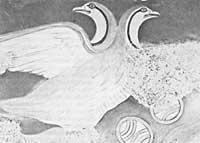
One of his works is Physics. It analyzes the philosophy of Nature, the principles of essence, matter and image, movement, time and space, the outer sphere of continuous movement kneading and the motor that does not move for it. Aristotle considers that in order to maintain the movement of a body, the cause of the movement must continue constantly. Instead, Plato, and apparently, thought that this cause should only act by diverting the body down its direct path.
In his work "On Kneading", Aristotle descends from top to bottom, that is, material and mortal, and on this journey he takes care of the creation of things. In his opinion, through the principles of heat and cold, dry and humid, opposed by two, the four raw materials are created: fire, earth, water and air. Aristotle added the ether to these four terrestrial elements. This moves circularly and in this way you can form perfect and inputrefent Orchard bodies.
In his work "Meteorology" deals with the space between the Amasado and the earth. In this space there are planets, comets and meteors. It contains some ancient theories about rainbow, vision and colors. The fourth book contains some ancient ideas about chemistry, but it seems that this book was not written by Aristotle, but by his successor Straton.
Trapped in the soil there are two types of breath: one produces aromas or moist, generates metals and the other generates smoke or droughts, rocks and minerals. It provides some ideas about solidification and fusion, creation and corruption, and the particularities of composite bodies. For us, Aristotle's meteorology is inferior to its biology. However, it had great influence in the Middle Ages.
Undoubtedly the most prolific result of Aristotle in the field of Science corresponds to Biology. This field has been developed in his works "De anima", "Historia animalium", "De partibus animalium", "De motu animalium", "De incessu animalium" and "De generatione animalalium". The amount of information in all these works is enormous. It may be thought that while most of this information is not acceptable today, the rest is surprising for its depth. Due to the amount of information on the work mentioned, it is considered impossible for a single person to receive it. Therefore, it is now recognized that Aristotle had also received materials from his classmates and students.
Aristotle considers life in biology, "self-feeding and pushing towards natural growth and degeneration." He divided zoology into three parts: a) General phenomena about animal life, natural history. b) Parts of animals, their organs and functions, anatomy and physiology c) Fertilization and reproduction of animals and embryology. It alludes to more than 500 animals, some of them with great precision, and in its more than one quarantine, represents the recognition by dissection with diagrams.
As has been said before, in this vertigo material there are many things that have not been reproved until the last centuries: He verified that whales are bivalve; he distinguished between crunchy and vertebrate fish; he investigated the development of the fetal state of the chick (in this research he studied the beats during cardiac structuring and their stay inside the shell).
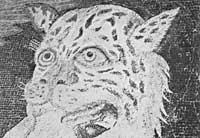
Also in Embryology he published good ideas. According to ancient ideas, the generator of life was only the male, to which the female only gave place and feeding. This idea was totally accepted at that time and was the fixed basis of some patriarchal traditions (today too?) Aristotle expressed the role of females in fertilization. He believes that the fetus is something that is sleeping in the female and that he has only to wake up to begin with.
In the classification of animals he had to flee from certain previous tendencies or customs. Previously the principle of dichotomy was fully assumed. Depending on it, animals or fins and not flown, etc. Aristotle realized that, according to this principle, very close animals should be integrated into opposite groups, such as winged ants and cantilevers. Therefore, he ruled out this classification principle and, taking into account other particularities, established a classification much more in line with the current one.
In the field of physiology, although often his conclusions were erroneous, his research pathways were a breakthrough. It seems that he also used the bibisection. Thus, for example, after providing the ideas of his predecessors on breathing, he indicates: "the reason that these researchers do not correctly express the facts is that they do not have knowledge of the internal organs and do not accept the doctrine that everything that Nature does has its objective. When investigating the objective of animal respiration, they should first investigate the function of organs (such as gills and lungs) to find the real reason more easily."
Before making any theory about organ functions, saying that a deep analysis of the anatomical structure is necessary is a great advance. According to this, Aristotle dealt with the structure of some animals and the functioning of their sacks or lungs. Unfortunately, when drawing conclusions, due to the humility of the degree of knowledge of chemistry at that time, he could have little help: on the one hand, the only gas that was known was air, and on the other, the only one that could do was air, it was accepted that it was heated or cooled.
Therefore, according to the theory that Aristotle could extract, the objective of breathing was simply to cool the blood. Although today we know that this is empty, we have to recognize that it is the most logical reason that could be given considering the time. On the other hand, surprisingly, against the theories of Alkmeon and Hippocrates, who placed the center of the mind in the brain, Aristotle adopts the heart as a place of intelligence. This, coupled with the denial of plant sexuality, meant a certain delay in this field.
As mentioned above, Aristotle was a little more erroneous than in biology in the field of physics (and also in astronomy). He fought and won against atomist theory. But the root of this struggle was not verified, but one phenomenon or another did not coincide with its theory of Nature. Therefore, if direct theory (like the atomist), based on experimental phenomena, is based on the mere idea of intelligence, we clearly see that pulling upside down is easy.
According to the atomist theory of Democritus, in the vacuum it was said that the bodies of great weight fell faster than the light ones. Aristotle, for his part, denied that in the vacuum, both heavy and low, they were going to fall at the same speed… but as this is impossible, IT IS NOT EMPTY!. In rejecting the void, he had to discard all the concepts of atomist theory that affect him: If all things were made up of the same final elements, all would have to have weight and would not give up their own light things, that is, those that in principle rise.
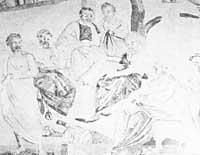
Thus, a large mass of fire or air would weigh more than a piece of land and in addition the soil and water would not be submerged in the air or in the fire, as they are submerged. Aristotle did not know the concept of density. For this we must wait for Archimedes and, according to him, like Plato, the bodies reached their natural balance and tended to a direction.
Aristotle, for his part, accepted the geocentric theory.
According to this, the Earth is the center of the Universe. Unfortunately, although Aristarco postulated heliocentric theory, due to Aristotle's fame for years and years astronomers did not accept this last theory. However, according to Aristotle the Earth was spherical.
In rejecting atomist theory, Aristotle accepted old Pythagorean ideas. One of them was that matter four was composed of the first basic particularities, which are by pairs and opposite: heat and cold, dry and humid. These four particularities come together in pairs to form the four elements: earth, water, fire and air. Finally, all the other bodies we know through will be created: water, wet and cold; hot and dry fire, etc.
Leaving aside the work of the different fields of science, Aristotle did a great job on philosophical topics, but in this work we will not deal with them. However, before the Aristotle accounts end, we have to say that we also have the inventor of formal logic. Therefore, there is no reason to put his name on top of human thought. He used this path in the field of science, more specifically in mathematical subjects and in geometry. Unfortunately, formal logic occupies little space in the field of experimental sciences, since its objective is not formal deduction based on previously accepted premises.
Fortunately, the scientists of our time, immersed in the experimental world, have not been too concerned about the formal norms of logic. But because of Aristotle's shadow, both Greek and Middle Ages science often sought real, totally real premises, to then use the inductive pathway. And the result of this behavior is known to all.
However, and despite not succeeding in one thing or another, in the field of human thought (including science) we must perfectly recognize that it is one of the greatest results of Aristotle.





